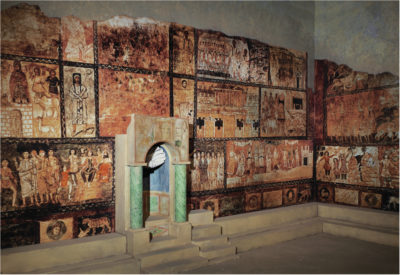Archaeological remains of ancient synagogues are often limited to foundation walls, decorated and inscribed mosaic floors, stone inscriptions and bits of painted plaster. But accidents of history assured something remarkable in the case of the synagogue from the Syrian town Dura Europos, whose assembly hall was preserved, nearly intact, from antiquity. This lecture will highlight some of the most unusual features of this synagogue assembly hall, including the elaborate wall paintings that rendered scenes from the Hebrew Bible that once decorated its walls; the fancifully painted tiles that once adorned its ceiling; human teeth found deliberately buried inside its doorways; and graffiti that ancient visitors once applied to its walls and around its doorways. While the Dura synagogue is well known to archaeologists, scholars of ancient Syria and students of ancient Jewish populations, this talk will consider how examinations of these diverse types of evidence, when considered together, can support new interpretations of the synagogue space and its use in antiquity.
Karen B. Stern is Associate Professor of History at Brooklyn College. She conducts research across disciplines of archaeology, history, and religion and teaches courses on Mediterranean cultural history and material culture of Jews in the Greek and Roman worlds. Her publications include the recent Writing on the Wall: Graffiti and the Forgotten Jews of Antiquity (Princeton University Press, 2018); and Inscribing Devotion and Death: Archaeological Evidence for Jewish Populations of North Africa (Brill 2007).


